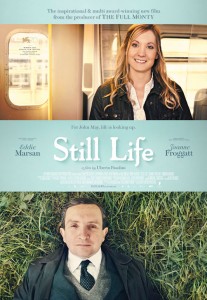 Still Life is the story of John May, a local council worker who has the job of trying to contact the next of kin of those who die alone. For 22 years he has undertaken his work with meticulous care and kindness. Such is his belief in the dignity of human life, even in death, that he goes above and beyond to ensure that each person is given a thoughtful and meaningful farewell, even if he is oftentimes the only mourner at their funeral.
Still Life is the story of John May, a local council worker who has the job of trying to contact the next of kin of those who die alone. For 22 years he has undertaken his work with meticulous care and kindness. Such is his belief in the dignity of human life, even in death, that he goes above and beyond to ensure that each person is given a thoughtful and meaningful farewell, even if he is oftentimes the only mourner at their funeral.
However it’s precisely the care and attention that he shows to the dead that sees John made redundant. In an age of “efficiency” John’s patient concern for the deceased is not valued by his employer. As his boss explains while laying John off, “the dead don’t care” for all the kindness that he shows them.
Before he finishes up with the council John is given one final case – the task of searching for the relatives of his elderly neighbour Billy Stoke. And it’s in discovering Billy’s long lost family members that we’re let into more of the world of John May and the selfless way that he undertakes his work.
Still Life is a beautiful film. It is beautifully shot and the story is tenderly and gently told. The soundtrack is equally fitting. But as I watched I felt that the true beauty of the film came from somewhere else. What makes this film so beautiful is the way that John does his work. His underlying selfless character shines through in each and every task he undertakes. His daily labour is a testimony to this deeper character, and it is attractive, it’s beautiful.
It’s plain that John is not doing his work for financial reward – he earns very little. And it’s equally obvious that he’s not doing his work for the acclaim that he might receive from those he looks after, after all they’re dead! No, John works in the way that he does out of the overflow of his selfless character. And this selfless character is unmistakable.
There is a profound, but simple lesson in this film for those of us who might be Christian in the workplace. How we do our work matters. It matters because our work is a clear demonstration of the overflow of our character. When the Gospel touches and renews our lives it should transform our motives for our work – not for financial reward or reputation, but for the selfless service of others. Through our work we can and should love others. This new motivation for our work cannot be missed when it overflows into the way that we undertake our daily tasks. And when it does it is attractive, it’s beautiful.
For that reason alone our work matters to God – it’s an arena for daily demonstrating the transforming power of the Gospel, for good. How you work, as you love and serve others, is a powerful testimony to the beauty of the Gospel.
Andrew Laird is the director of Life@Work, an initiative of the Melbourne City Bible Forum, which aims to help Christians think through how their faith intersects with their work.
Email This Story
Why not send this to a friend?


